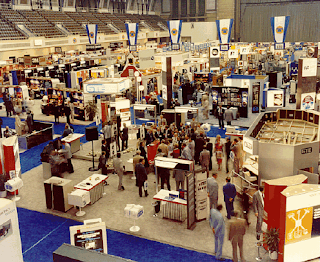
1. Establish Your Goal
Your goal needs to be based on whom it is you're targeting and what you want to get across to them. Be clear on what you want to accomplish: are you looking for visibility, brand awareness, lead generation, new product launching or product sales?
2. Select the Right Event
You want to make sure the people who fit the profile of your customer so your effort is worthwhile. Before making a decision, find out what the particular tradeshow's objectives are, the audience, the hours, and all of the activities planned by the show's organizers.
3. Select Your Exhibit Space
When selecting your space on the exhibit floor important considerations are size, location, what kind of exhibits/exhibitors will be around you, traffic patterns around the space, your special requirements (electrical installation, lighting, height, and temperature are a few).
4. Make it Easy for Your Visitors to Identify Your Products & Services
Your prospect will give your space about 10 seconds before deciding whether to stop or go on. How do you make them stop? Having the biggest booth and an expensive display doesn't guarantee success. Make relevant information about your products and services available, provide samples and giveaways, and consider video presentations on a laptop computer.
5. Have Qualified Staffers
Your staffers should be able to engage your visitors. Have specific instructions for staffers including what time they should arrive and leave, break times, information they need to gather from visitors, areas they should focus on when speaking to visitors and more. Staffers should be professional in appearance and easily identifiable by a uniform and nametag. You need at least 2 people at all times and more during peak times. Plan for several staffers to work a multi-day event so that your team can get proper rest.
6. Select the Right Marketing Materials and Promotional Items
The purpose of a promotional item is to keep your name in front of your prospect after the show; therefore it must connect the dots between your goal, your product or service, and your target audience. The idea is to give out an item that is useful, one that the recipient is not likely to buy for him/herself, and is not likely to break or fall apart. Also, consider having a better gift item for prospects with a higher profile.
7. Have a Follow-Up Strategy
This is where most businesses fail. Not having a follow-up strategy in place before the show will cause you to lose valuable leads and possibly tarnish your reputation. You're going to meet a lot of leads and many will have specific requests and questions. When you go back to your office the day after the show, you need to begin your post-show work. Have a pre-established and simple method in place to make contact with all leads in a timely manner. This sets you apart from others who were at the show and it ultimately leads to higher conversions and sales.
